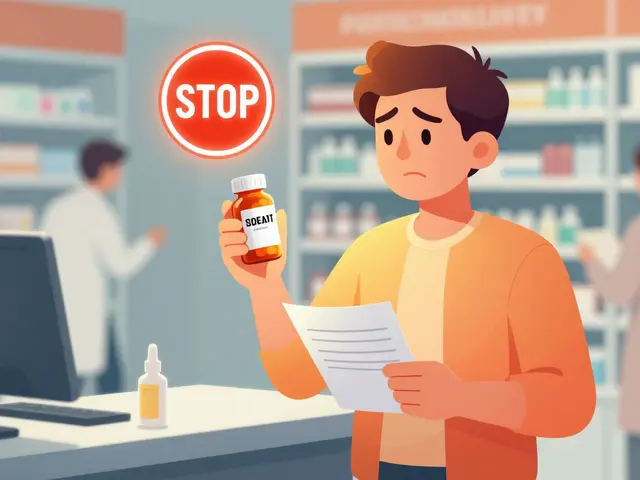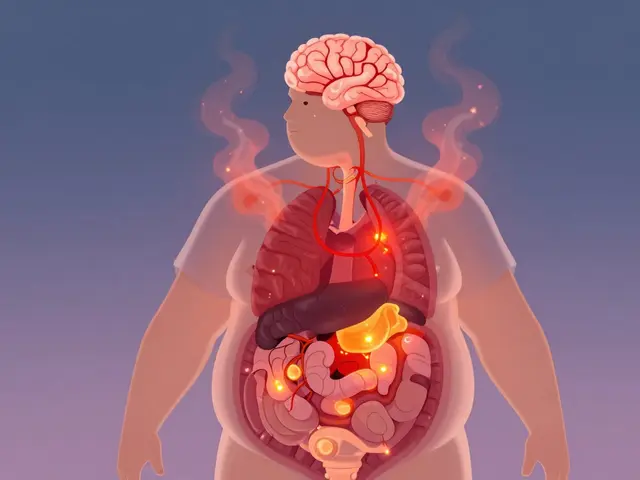What to Do If You Receive the Wrong Medication from the Pharmacy
January 18 2026Side effect: how to recognize and handle drug reactions
Side effect is a short way to say an unwanted effect from a drug. Some are mild and pass in days. Others need fast care. This page helps you spot common patterns, manage mild reactions at home, and know when to call a doctor.
How to tell if a reaction is serious
Serious signs include trouble breathing, swelling of face or throat, chest pain, sudden fainting, severe skin rash, or very high fever. If you see any of these, get emergency care now. For less severe problems — like mild nausea, headache, or fatigue — check the leaflet and call your prescriber or pharmacist before stopping a medication.
Examples from our articles: Prilosec (omeprazole) can cause headache, stomach pain, and diarrhea for some people. Reminyl (galantamine) may bring nausea, vomiting, or dizziness when you start. Decadron (dexamethasone) can raise blood sugar and affect mood. These are common patterns, not a full list. If a new symptom starts after a medicine change, treat it as possibly related.
Practical tips to manage mild side effects
Start with simple steps: take the drug with food if the leaflet suggests it, drink water, rest, and track symptoms in a notebook or phone. If a pill causes nausea, try smaller meals and waiting 30 minutes after eating to lie down. For sleep trouble, avoid caffeine and use a consistent bedtime routine. If sexual side effects or mood changes appear, don't ignore them — talk to your prescriber about dose change or switching drugs.
Before you buy meds online or try alternatives, check safety. Use the guidance in our posts about reputable pharmacies and verification tools like CIPA or PharmacyChecker. Counterfeit or wrong-dose products can increase side effects. When switching between brand and generic, or between thyroid products like desiccated thyroid and Synthroid, watch for changes in energy, weight, or heart rate — those can signal a dosing issue.
Keep a clear list of all medicines, supplements, and herbs. Interactions are a common cause of unexpected side effects. Share that list with every provider and pharmacist. If you travel while on long-term meds (for example apixaban or ribavirin), plan ahead for time zones and storage to keep doses steady.
Report serious or new reactions to your health provider and to your country's safety system (for instance, FDA MedWatch in the U.S.). Reporting helps others and can speed safety warnings. If you're unsure, call your pharmacist — they can often identify likely causes and suggest next steps fast.
Want article-specific side effect details? Check our posts on Prilosec, Reminyl, Sertraline, Decadron, and other meds linked to this tag to read practical, post-by-post notes and how users manage these effects in real life.
 1 Aug
1 Aug
Norethindrone Acetate and Hair Loss: A Possible Side Effect?
Well, folks, let's dive headfirst into the wild world of Norethindrone Acetate, a medication more tongue-twisting than my Aunt Sally's spaghetti! Can you believe it, this medical marvel might be playing hide-and-seek with your lovely locks, causing hair loss as a possible side effect! It's like a bad hair day, but on steroids - literally! Nevertheless, don't start sporting the bald look just yet, it isn't a sure-fire side effect for everyone, and it's always best to chat with your doc before jumping to conclusions. So, my hairy friends, keep your wigs on and remember, laughter is the best medicine, unless you're bald, then Norethindrone Acetate might come second!
Read More...




